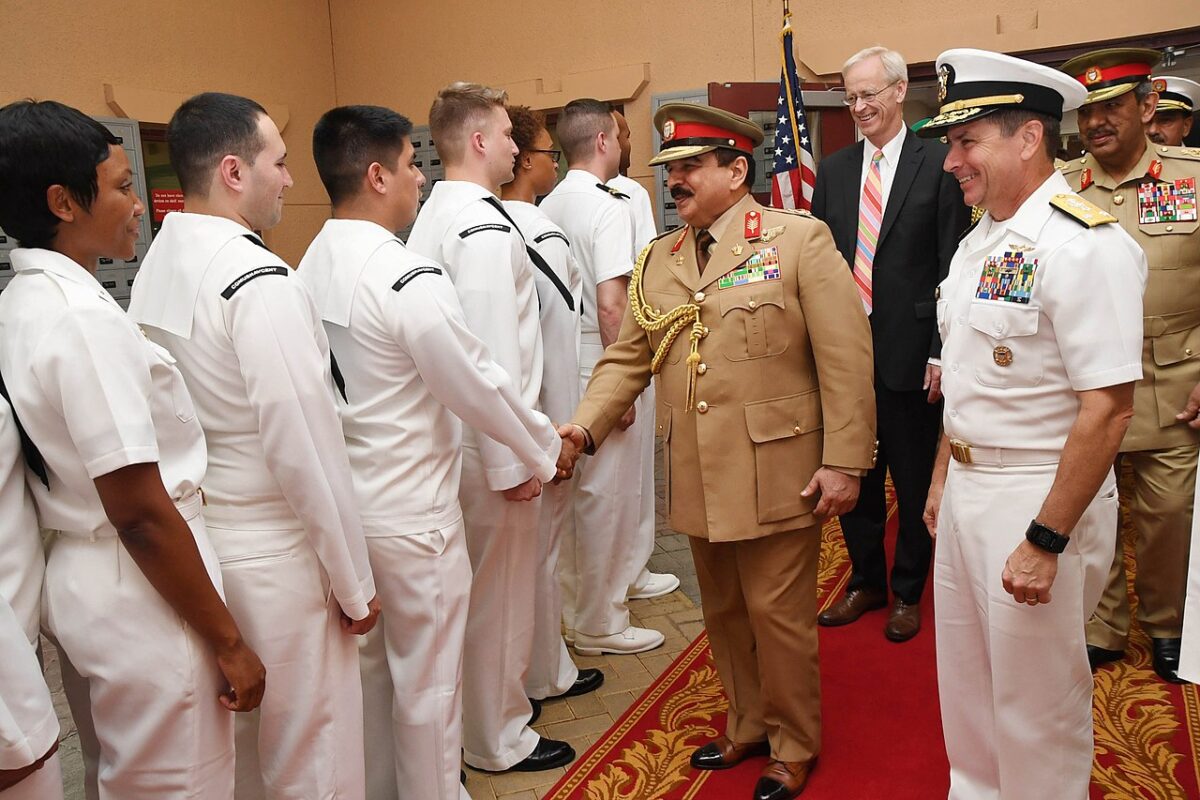The announcement from U.S. President Donald Trump on September 11 that the tiny pro-American Persian Gulf kingdom of Bahrain would normalize relations with Israel was yet another milestone in Israel’s dogged campaign to win regional recognition and acceptance from conservative Arab states.
Bahrain, an archipelago of islands near Saudi Arabia and Iran, was the second Arab nation after the United Arab Emirates to recognize Israel. Prior to taking this historic step, Bahrain opened its air space to Israeli aircraft.
Pundits have speculated that Oman and Sudan may be next in line to normalize relations Israel. But it’s doubtful whether Saudi Arabia, Bahrain’s close ally and the seat of Islam, will follow their example any time soon.
Israel’s normalization pacts with Bahrain and the United Arab Emirates were its third and fourth peace agreements with former Arab adversaries.
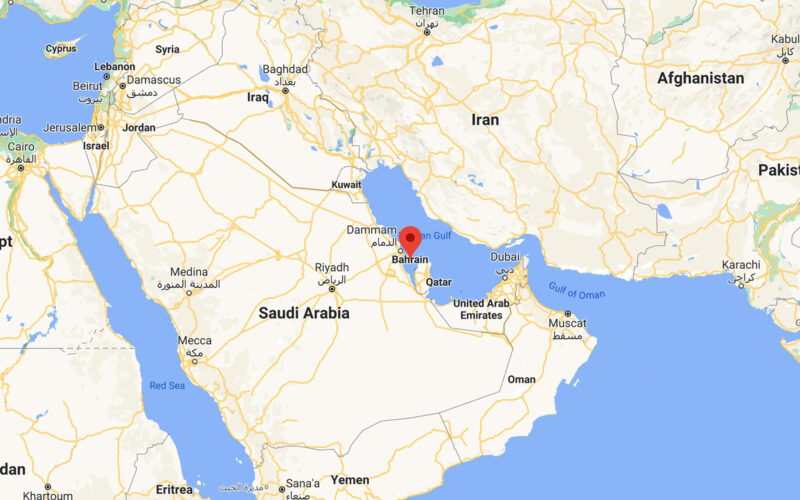
Israel signed peace treaties with Egypt in 1979 and with Jordan in 1994. Israel and Lebanon forged a peace accord in 1983, but the Lebanese government abrogated it in 1984. Mauritania, a North African state, established relations with Israel in 1999, but severed them in 2010 after Israel’s 2009 invasion of the Gaza Strip.
Israel’s normalization agreements with Bahrain and the United Arab Emirates represent a bitter blow to the Palestinian Authority, whose quest for statehood rests on the assumption that Arab League states will not recognize Israel until its protracted conflict with the Palestinians is fully resolved.
King Hamad bin Isa al-Khalifa of Bahrain told U.S. Secretary of State Mike Pompeo recently that he remains committed to the 2002 Arab League peace initiative, which calls for Israel’s complete withdrawal from the occupied territories and a resolution of the Palestinian refugee problem in exchange for Arab recognition of Israel.
Israel rejected the proposal, which was formulated by Saudi Arabia and embraced by its Arab League partners.
Bahrain and the United Arab Emirates, which are both Sunni-ruled states with a majority Shi’a population, continue to support a two-state solution to defuse Israel’s dispute with the Palestinians.
But their shared hostility to Iran — the preeminent Shi’a power in the Middle East which has been accused by Bahrain of fomenting unrest — removed their reluctance to establish formal relations with Israel. In a nutshell, they are putting their own national interests ahead of Arab solidarity with the Palestinian cause, which still enjoys immense popularity in the Arab and Muslim worlds. The late president of Egypt, Anwar Sadat, adopted this policy after his rapprochement with Israel starting in 1977.
Another factor to consider is that neither Bahrain nor the United Arab Emirates are burdened by territorial disputes with Israel. Nor have they ever participated in any of the wars Arab countries have waged against Israel since its creation in 1948.
Israel’s success in breaking the heretofore Arab consensus that peace with Israel would have to await a resolution of the Palestinian problem is doubtless a victory for Israeli Prime Minister Benjamin Netanyahu, who pays lip service to Palestinian statehood but effectively opposes it.
Three years ago this month, Netanyahu disclosed that Israel had achieved a “breakthrough” in its covert relations with moderate Sunni states. “This is a tremendous change,” he said. But he added that these unnamed nations were still not politically ready to publicly acknowledge informal ties with Israel.
This is no longer the case. After Trump’s announcement that Bahrain had joined the United Arab Emirates in normalizing ties with Israel, the Bahraini parliament issued a bold statement welcoming the dawn of a new era: “We confirm that this step is in the interest of regional security, stability and prosperity. It is in harmony with the true Bahraini approach, our long history of promoting openness and coexistence with all, and Bahrain’s social cohesion between different races and religions.”
Long before the most recent developments, Israel was busy forming links with Arab Gulf countries. Israel undertook these efforts in the wake of its 1993 Oslo peace accord with the Palestinians.
In 1994, Israeli Prime Minister Yitzhak Rabin was invited to Oman, where he was greeted by its ruler, Sultan Qaboos bin Said al-Said. Two years later, Israel and Oman agreed to open trade representative offices in their respective capitals. Rabin’s successor, Shimon Peres, opened Israeli trade offices in both Oman and Qatar.
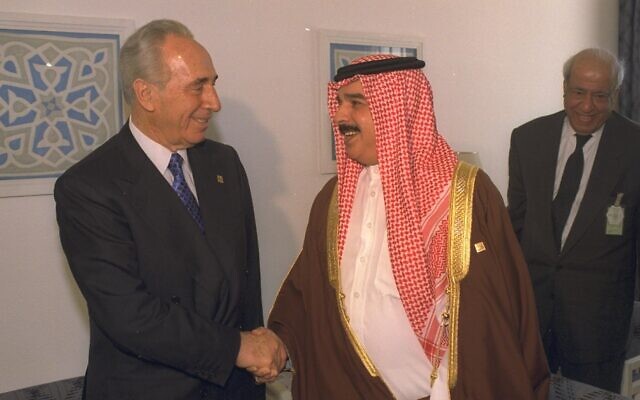
With the outbreak of the second Palestinian uprising in 2000, Oman suspended relations with Israel, leading to the closure of their trade offices. Qatar followed suit in 2009 after the outbreak of the first Gaza war in 2008.
Bahrain — a former Portuguese and British colony which declared independence in 1971 — had relatively few contacts with Israel during this period. But in 2005, King Hamad of Bahrain informed the U.S. ambassador, William Monroe, that he was prepared for coexistence with Israel.
As Monroe wrote in a cable published by WikiLeaks:
“The king spoke at some length on Israeli-Palestinian developments, expressing satisfaction at the positive turn of events. This is a good moment, he said, that can be important for stability in the region. He said that he had instructed newly-appointed Minister of Information Mohammed Abdul-Ghaffar to make sure that official announcements or statements coming out of the Ministry of Information do not refer to Israel as the ‘enemy’ or ‘Zionist entity.’
“He revealed that Bahrain already has contacts with Israel at the intelligence/security level (i.e., with Mossad), and indicated that Bahrain will be willing to move forward in other areas, although it will be difficult for Bahrain to be the first. When asked if Bahrain might look into developing trade contacts at some point, he said that this would have to await the establishment of “side-by-side” states (or a two-state solution).
“The king stated that Israeli-Palestinian peace, by helping stabilize the Middle East, will facilitate economic growth throughout the region. But he also suggested that, when the Palestinian question is removed from the equation and the Arab-Israeli dispute is settled, Iran’s ability to cause mischief will be lessened. The Iranians will no longer be able to exploit the Palestinian issue for their own objectives.”
In 2007, Israeli Foreign Minister Tzipi Livni and Bahraini Foreign Minister Khalid bin Ahmed al-Khalifa met in New York City.
Two years later, the crown prince of Bahrain, Sheikh Salman bin Hamad al-Khalifa, published an op-ed piece in The Washington Post endorsing Arab reconciliation with Israel once the “core issues,” the Palestinian question and Israel’s occupation of Arab lands, were settled.
Signalling that Bahrain was primed to reconcile with Israel, he wrote, “We should move forward toward real peace now by consulting and educating our people and by reaching out to the Israeli public to highlight the benefits of a genuine peace. Once we achieve peace, trade will follow … Trade will ensure the durability of peace … When stability pays, conflict becomes too costly. We must do more, now, to achieve peace.”
In 2010, a Bahraini princess checked into Haifa’s Rambam Medical Center to treat an undisclosed ailment, Israel’s former Deputy Minister for Regional Cooperation, Ayoub Kara, disclosed in 2016. Her convalescence in Israel lasted for about two months.
Bahrain, which hosts the U.S. Navy’s Fifth Fleet, extended an olive branch to Israel in 2016 when its foreign minister publicly mourned the death of Israel’s former president, Shimon Peres.
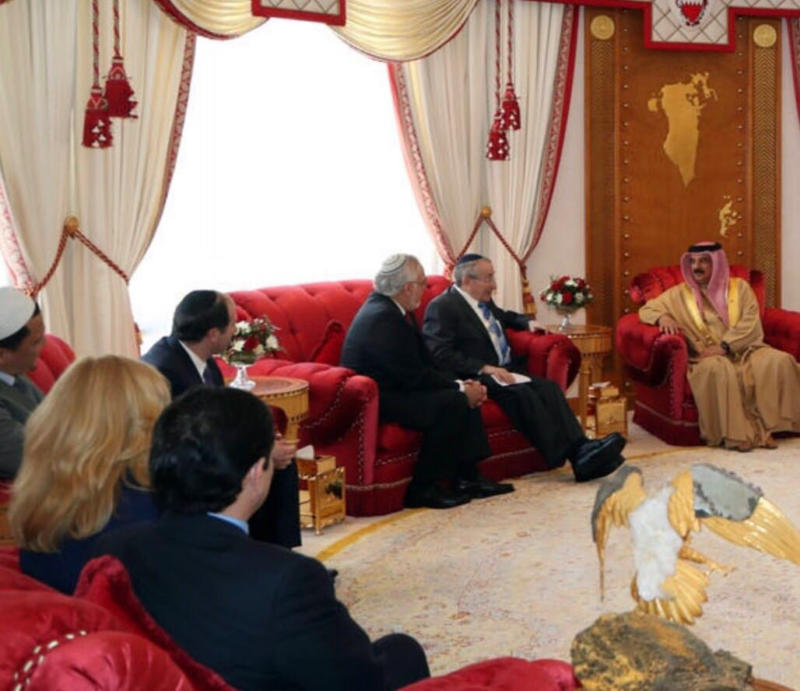
Toward the close of 2017, a delegation of 24 Bahraini religious figures paid a four-day visit to Israel to extoll the virtues of “religious freedom, peaceful coexistence and mutual respect and love.”
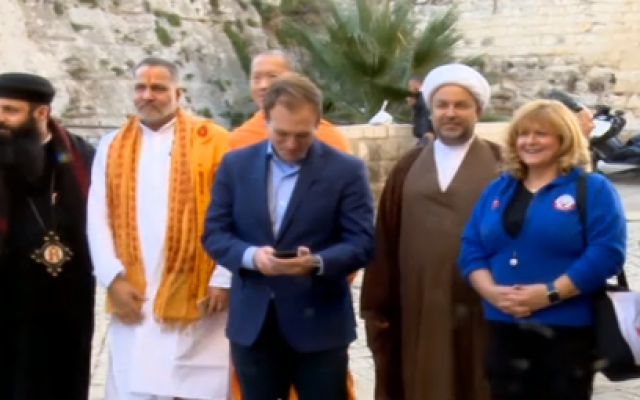
Officials from the Israeli Football Association, and a delegation from the Simon Wiesenthal Center headed by Rabbi Marvin Hier, were invited to Bahrain in the same year.
Hier and his colleagues met King Hamad, who told them that the Arab boycott against Israel is illogical, that there is no reason for hostility between Bahrain and Israel, and that he had no objection whatsoever to Bahraini tourists visiting Israel.
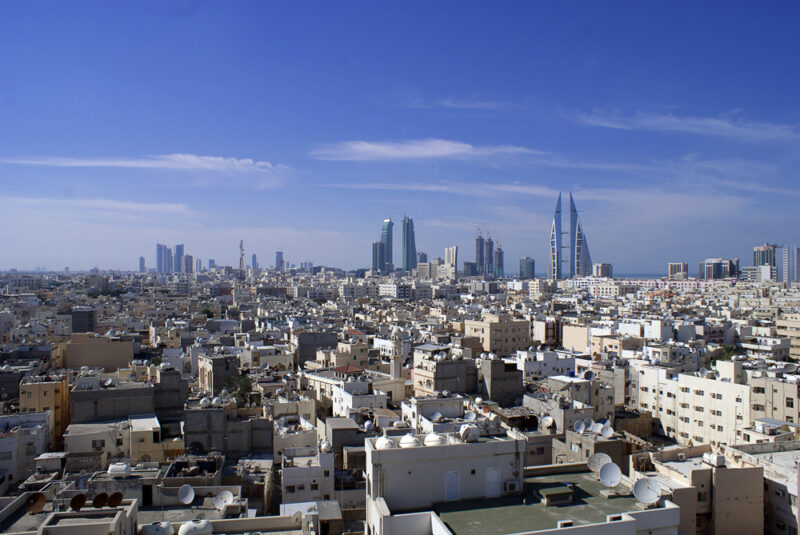
Last year, in June, Bahrain hosted a “Peace to Prosperity” workshop in Manama to promote the economic dimension of Trump’s Mideast peace plan, which was released this past January and vehemently rejected by the Palestinians and their closest allies.
During the conference, Bahrain’s foreign minister granted an interview to Israel’s Channel 13. He said, “Israel is part of this heritage of this whole region, historically. So, the Jewish people have a place amongst us.”
Voicing support for Israeli airstrikes against Iranian bases in Syria, he said, “Every country has a right to defend itself.” He branded Iran as a “major threat to the stability and the security of the region,” and said that Iran’s support for militant groups in the region has hindered Arab-Israeli peace efforts.
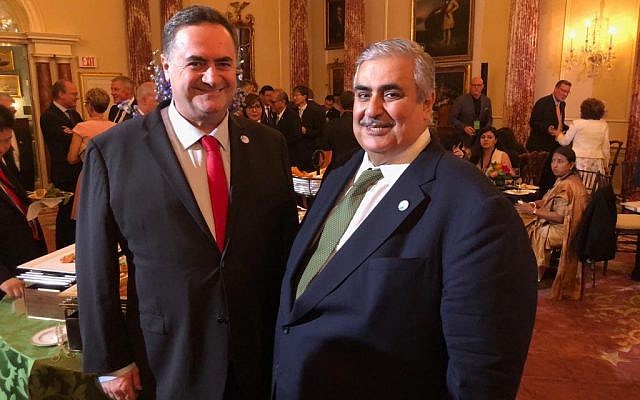
A month after the Manama workshop, he met Israel’s then foreign minster, Israel Katz, at the U.S. State Department and posed for a photograph with him.
Bahrain and the United Arab Emirates will respectively sign a Declaration of Peace accord and a normalization agreement with Israel in Washington on September 15, capping a month of frenetic diplomacy, the likes of which has not been seen in the Middle East since the Oslo process.
